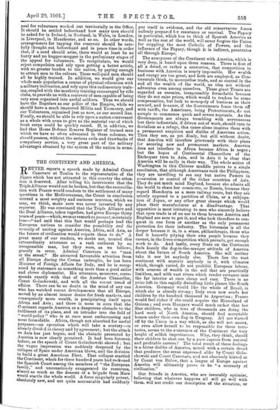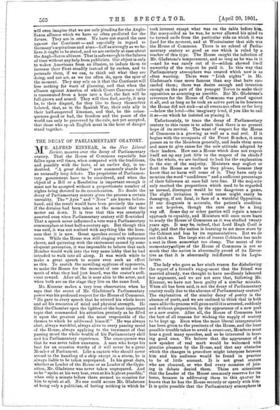THE CONTINENT AND AMERICA. R EUTER reports a speech made by
Admiral Count Canevaro at Toulon to the representative of the Figaro which has not attracted in this country the atten- tion it deserved. After telling his interviewer that the Triple Alliance would not be broken, but that the reconcilia- tion with France would conduce to the settlement of many questions in the Mediterranean, the Count in conclusion uttered a most weighty and ominous sentence, which we may, we think, make sure was never invented by any reporter. He was convinced that the Triple Alliance and the Dual Alliance, taken together, had given Europe thirty years of peace—which, we may remark enpassant,is certainly true—" and said that this fact would perhaps lead the European nations to consider the possibility and the necessity of uniting against America, Africa, and Asia, as the future of civilisation would require them to do." A great many of our readers, we doubt not, • treated this extraordinary utterance as a rash outburst by an irresponsible man, but they were, as we believe, gravely in error. Admiral Canevaro is no "man in the street." He attracted favourable attention from all Europe during the Cretan imbroglio, he has been Minister of Foreign Affairs for Italy, and he is recog- nised by statesmen as something more than a good sailor and clever diplomatist. His utterance, moreover, corre- sponds exactly with that of the Austrian Chancellor, Count Goluchowski, and with all the recent trend of affairs. There can be no doubt in the mind of any one who has watched recent developments that all Europe, moved by an almost insane desire for fresh markets, and consequently more wealth, is precipitating itself upon Africa and Asia ; and there is none in ours that the Continent regards America as a dangerous obstacle to the fulfilment of its plans, and an intruder into the field of " world-policy " who is at once most embarrassing and most formidable. Africa, though not absorbed for useful purposes—an operation which will take a century--is already divided in theory and by agreement ; but the attack on Asia has just begun, and the obstacle presented by America is now clearly perceived. It bad been foreseen before, as the speech of Count Goluchowski showed ; but the vague impression was suddenly deepened by the collapse of Spain under American blows, and the decision to build a great American Fleet. That collapse startled the Continent, which for three hundred years had reckoned the Spanish Court among the members of " the European family," and unconsciously exaggerated its resources, almost as much as the descent of a brigade from Mars would startle the whole world. A force singularly potent, absolutely new, and not quite accountable had suddenly put itself in evidence, and the old conservative forces sullenly prepared for resistance or reprisal. The Papacy in particular, which has to think of Spanish America as well as the rest of the world, will never forgive the Union for crippling the most Catholic of Powers, and the influence of the Papacy, though it is indirect, penetrates all through Europe.
The annoyance of the Continent with America, which is very deep, is based upon three reasons. There is first of all a dread, or rather a conviction, that competition in business with America is nearly impossible. Her wealth and energy are too great, and both are employed, as Con- tinentals think, to monopolise trade, and so control in the end all the wealth of the world, an idea not without advocates even among ourselves. These giant Trusts are regarded as enemies, inexpressibly formidable because they do not raise prices, which would to traders be some compensation, but look to monopoly of business as their reward, and because, if the Governments fence them off with tariffs, the Americans, being Protectionists, do not scruple to commence quick and severe reprisals. As the Gbvernments are always trembling with nervousness lest their industrials, if driven out of work, should turn to Socialism as a refuge, this cause alone inspires them with a permanent suspicion and dislike of American action. Then they see, as yet dimly, but still without doubt, that America will interfere grievously with their plans for securing new and permanent markets. America does not interfere in Africa because Africa is negro ; but the hopes of Continental Chancellors of the Exchequer turn to Asia, and in Asia it is clear that America will be sadly in their way. The whole action of Washington in this Chinese muddle points to a single conclusion, that although Americans took the Philippines, they are unwilling to see any but native Powers in possession or control of the richer countries of Asia. They do not much mind England, because she admits all the world to share her commerce, or Russia, because they regard Manchuria as a mere railway route, but they are utterly opposed to a partition of China, or a subjuga- tion of Japan, or any other great change which would place their manufactures at a disadvantage. That opposition is most irritating to men who sincerely believe that open trade is of no use to them because America and England are sure to get it, and who look therefore to con- quest in one form or another as the only permanent protection for their industry. The bitterness is all the deeper because it is, in a sense, philanthropic, those who feel it honestly pitying their own people because they cannot, in the fierce competition which prevails, get enough work to do. And lastly, every State on the Continent feels keenly the dog-in-the-manger attitude of America about the future of South America. She will neither take it nor let anybody else. There lies the vast continent with scarcely anybody in it, with climates which, though varied, do not prohibit European labour, with sources of wealth in the soil that are practically limitless, and with vast rivers which render entrance into the far interior at once cheap and easy. There is no prize left in this rapidly dwindling little planet like South America. Germany would like the whole of Brazil, in which she is already strong ; Italy even now sends her children by the hundred thousand to Argentina ; France would feel richer if she could acquire the Hinterland of Guiana ; and even Hungary would much rather that her Slav children, who in tens of thousands are doing the hard work of North America. should find acceptable homes under their own flag in Uruguay. All are warned off by the Union in a way which, as she will not annex, or even allow herself to be responsible for these terri- tories, seems to the statesmen of the Continent the very height of selfish impertinence. Why, they think, should their children be shut out by a pure caprice from natural and profitable careers ? The total result of these feelings is a bitter dislike of America, mixed with a certain dread that produces the sense expressed alike by Count Golu- chowski and Count Canevaro, and not obscurely hinted at by Count von Billow, that a league of Europe against America will ultimately prove to be " a necessity of civilisation."
Our friends in America, who are incurably optimist, believing that whatever happens all will go well with them, will not credit our description of the situation, or will even imagine that we are only pleading for the Anglo- Saxon alliance which we have so often predicted for the future. They are in error. We have not stated the case against the Continent — and especially in regard to Germany's aspirations and aims—half as strongly as we be- lieve it ought to be stated, and we are entirely at ease about the Anglo-Saxon alliance. That is safe enough in the fulness of time without any help from publicists. Our object is only to waken Americans from an illusion, to induce them to increase their Fleet steadily instead of by rushes, and to persuade them, if we can, to think out what they are doing, and not act. as we too often do, upon the spur of the moment. They may rely on it that the Continent will lose nothing for want of planning, and that when the alliance against America of which Count Canevaro talks is transmuted from a hope into a fact, the fact will be full-grown and armed. They will then find, sorely, it may be, to their disgust, for they like to fancy themselves beloved, that, as in the Spanish War, their only ally is their half-suspected kinsman, and that, be the conse- quences good or bad, the freedom and the peace of the world can only be preserved by the rule, not yet accepted, that those who sp2ak English must in the hour of danger stand together.







































 Previous page
Previous page